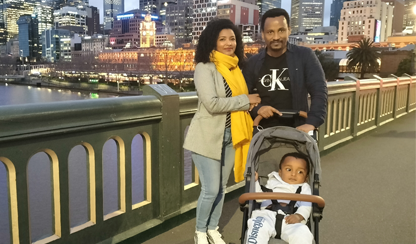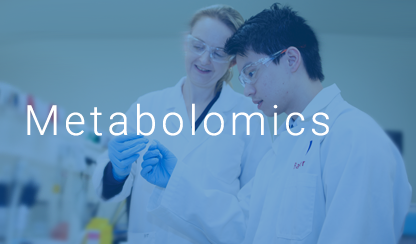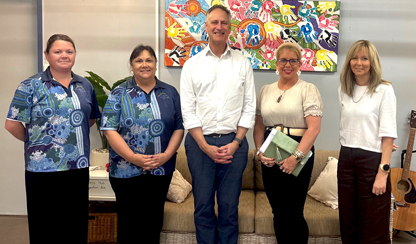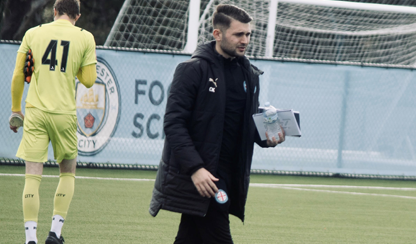06 August 2021
Institute news
 We spoke with postdoctoral scientist, Dr Habtamu Beyene, who recently completed his PhD and is working in the Institute’s Metabolomics laboratory. Habtamu completed his PhD at Monash University despite the challenges of being separated from his young family in Ethiopia for much of 2020. His work aims to advance understanding of the role of lipids in health and disease.
We spoke with postdoctoral scientist, Dr Habtamu Beyene, who recently completed his PhD and is working in the Institute’s Metabolomics laboratory. Habtamu completed his PhD at Monash University despite the challenges of being separated from his young family in Ethiopia for much of 2020. His work aims to advance understanding of the role of lipids in health and disease.
You undertook your undergraduate studies in Ethiopia. How is Ethiopia harnessing science and technology?
Low income countries like Ethiopia invest less in science and are often late to adopt new technologies, mainly because of economic reasons. Although, a certain level of emphasis has been given over recent years, science and innovation are still in their infancy. Making use of science partly depends on a country’s tendency to retain people who are passionate about science. Ethiopia has many brilliant young minds but the majority emigrate to high income countries such as Australia, the US and UK where the likelihood of being successful in a scientific career is higher. I think harnessing science and technology to the expected level requires improving the horrendous situation of science for the sake of aspiring scientists that portray the intellectual future of their countries.
What attracted you to the Baker Institute?
I had a strong passion for research from an early age. Having completed my Bachelor degrees in medical technology in 2007 and my MSc in 2011 back in Ethiopia, I had been looking for a place where I could realise my dream of becoming a scientist. While I was browsing through potential research institutes and labs in Australia, I came across the Baker Institute. The values, the well-established research facilities, and most importantly, the strong and supportive team in the Metabolomics laboratory attracted me the most. I got a prestigious higher research degree scholarship from Monash University and started my PhD in 2017 under the guidance of Professor Peter Meikle, who has established a sophisticated lipidomic profiling facility, and Professor Dianna Magliano, who heads the Diabetes and Population Health unit. I found Professor Meikle to be the best mentor a student could ask for, allowing me a highly dynamic and flexible environment to develop my knowledge while providing expert supervision and feedback. It was a privilege and honour to do a research degree and work under his guidance and the Baker Institute at large.
You recently completed your PhD. What was the focus?
I recently completed my PhD (Biomedical Sciences) at Monash University, Melbourne, Australia. My PhD focused on understanding the relationship between lipid metabolism and insulin resistance, type 2 diabetes (T2D) and cardiovascular disease (CVD) using sophisticated liquid chromatography coupled with mass spectrometry combined with Artificial Intelligence (AI) based predictive modelling. T2D and CVD are the major health challenges in Australia. There is a need to improve the existing tools meant for early identification of these conditions. Hypothesising that dysregulation in lipid metabolism precedes the onset and progression of T2D and/or CVD, I comprehensively examined at the level of baseline lipidomic profiles in relation to cross-section and future disease outcomes utilising three independent human cohorts: The Australian Diabetes, Obesity and Lifestyle Study (AusDiab) with over 10,000 participants and the Busselton Health Study (BHS) with over 4000 participants. The findings provide important insights into the role of lipids in health and disease.
How are you managing the ups and downs of COVID-19?
It has been a ridiculously challenging time in my life, although I progressed very well with my studies. In March 2020, just prior to the COVID outbreak, my wife returned to Ethiopia with our 11-month-old son. This, of course, was very bad timing and she was not able to return to Australia due to the subsequent boarder restrictions. This placed tremendous financial and emotional stress on me, and has slowed my otherwise excellent progress. Needless to say, the absence of my family at that time was quite disabling, especially as my son was only 11 months. Luckily, my application for exemption to the travel restrictions was favourably assessed by the immigration department and border protection, and finally I was able to bring my son and wife back to Australia early this year. During circumstances such as the COVID-19 pandemic, the most important thing is to keep connected with friends and family. I feel privileged to be part of the Baker Institute community, and the Metabolomics team in particular.
What do you do outside of the lab to relax?
Pre-COVID-19, I enjoy outdoor dining and going out for drinks. I also love cycling to keep myself active.





